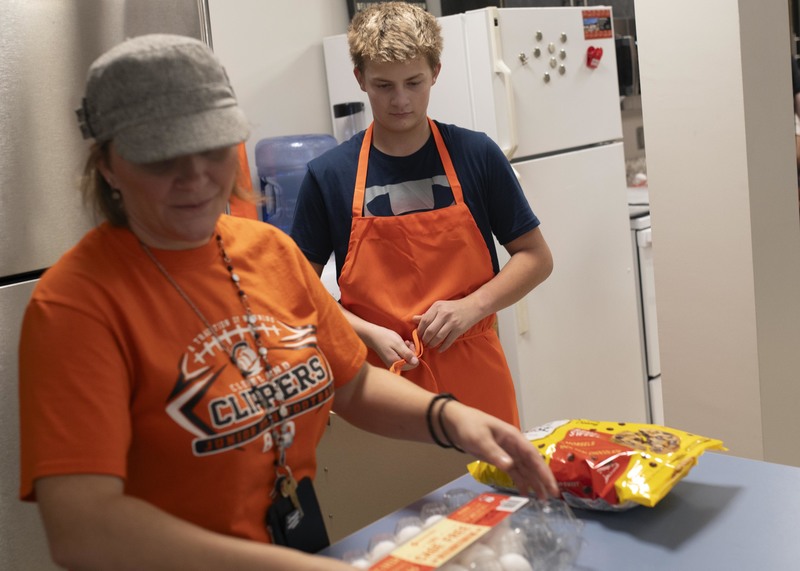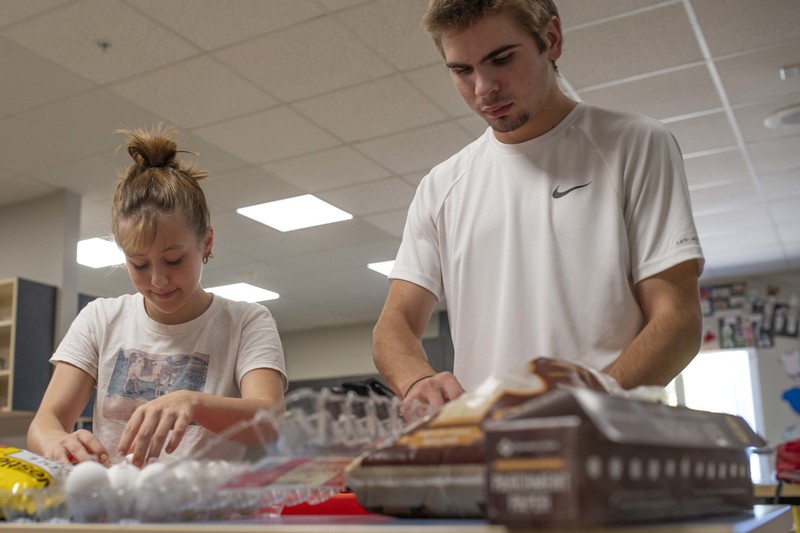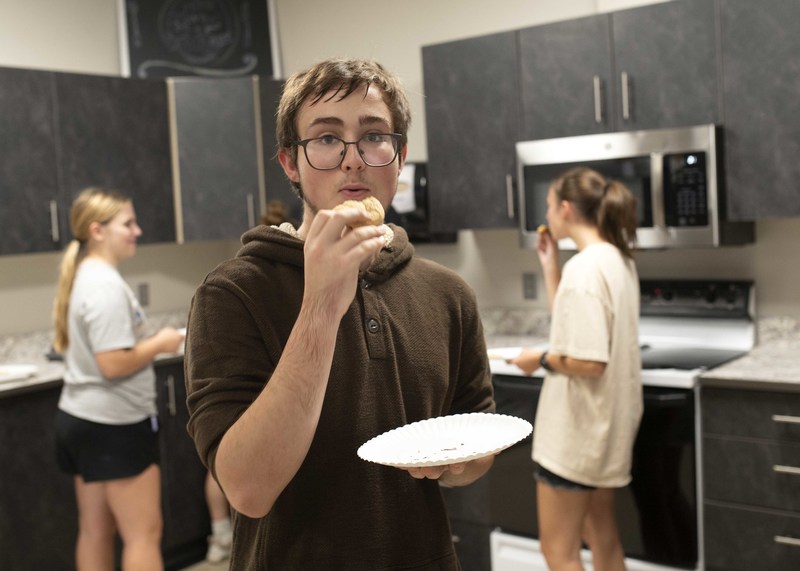Although the parents of new teacher Amanda Whiteis weren’t educators in the formal sense, they influenced her career choice more than anyone.
“Each day, they taught about work ethic, discipline, compassion, organization, time management, teamwork, life skills, communication and so much more.”
But Whiteis, the new family and consumer sciences (FACS) teacher, recognized that many young people didn’t have the same examples to follow as she did.
“When I looked into teaching FACS, I realized I would be able to teach so many of these extremely important life skills to students that may not be learning them in other areas of their lives. I also would be helping them to explore careers and figure out what they are meant to do in life.”
In hiring Whiteis, Cleveland school brings back a program that it hasn’t had since 2001. Prior to then, the district offered classes to high school students that included child development and food preparation, said principal Scott Lusk. But that year, the school faced a budget deficit, and the FACS program went on the chopping block.
Much of the FACS curriculum didn’t go away though. Instead, it was spread among other teachers, Lusk said.
“Courses like Consumer Math and health were built into math classes and physical education.”
Now, as the school has grown, and its financial position has strengthened, FACS went back on the table. For CHS students in grades seven through 12, that means an opportunity to learn a range of life skills: culinary arts, including kitchen basics, nutrition, safety and sanitation; housing and interior design; fashion design; child development and personal finance.
Sustainable practices are also sewn into FACS: mental development, including interpersonal relationships, communication, positive mental health, self-esteem and coping with stress; personal growth, including goal setting and growth mindset, becoming a leader and making positive choices; and life planning, including college exploration and readiness and career exploration.
“Many people think of FACS as ‘Home Ec’ since that is from where the program evolved,” Whiteis said. “But FACS has become so much more. The different content areas taught now are always looked at through the lens of career pathways. So, for example, if you are in my Design Basics class, you will get a taste of what the interior and fashion design industries are about. Culinary arts isn’t just about cooking. It is about learning about the industry itself. The students exploring career pathways and learning hands-on life skills will be so much more prepared for life after high school.”
The third of six children, Whiteis was raised in Morristown and graduated from WEM high school. As a college sophomore, she decided to become a teacher.
So she earned a Bachelor of Science in FACS Education from Minnesota State University, Mankato. She taught at Mankato West before applying for the for the job at Cleveland.
“At my core, I am a small-town girl, soI always hoped I would end up teaching in that type of environment. I have always heard how special a community Cleveland School is. My sister’s children attend here, and I have friends who are already a part of the Clipper family who encouraged me When I saw that they were thinking about starting back up a FACS program after all these years, I felt I was the person for the job.”
Whiteis also worked as a culinary specialist for the Art Institutes in Minneapolis for seven years. That stint provided her with more culinary training and experience than a typical FACS teacher has. Also upping her resume, she has operated a home design, decorating and remodeling business for the past dozen years and even does hands-on labor.
“Working in these industries outside of teaching has given me a unique perspective, and I feel it enhances my ability to teach the content to my students,” she said.
Whiteis operates out of two spaces: the former FACS room, recently a Spanish classroom, for more general classes, and the previous cafeteria kitchen for culinary arts classes.
The FACS room, with a pair of kitchen stations, is set up to function like a college culinary arts classroom, so she can do culinary demonstrations up front for the students to observe and then put their own skills into hands-on practice. The former kitchen, adjacent to the little gym, has been outfitted with two new industrial gas ovens and a stainless demonstration island at the front of the classroom. Students will observe and work hands on from stainless steel tables with stools.
“Students will gain experience in running an actual kitchen that will expose them to all the facets of operating a food service program,” said Lusk.
Whiteis knows she has some work to do to get the program in order.
“Starting a seven through 12 FACS program from scratch in a school that hasn’t had one for over 20 years is a big undertaking. I want to focus this year on aligning my curriculum from seventh through 12th-grades to build on one another.”
But she has a vision to expand FACS and weave it into other programs at the school.
“I see Culinary Arts catering events at the school as well as competing in some culinary arts competitions. For Child Development, I want to give them experience running a ‘play school’ program of some sort as a part of the curriculum. I would love to partner with the Ag and Industrial Technology programs at school to give the students experiences where our contents overlap. I see the design students doing some sort of ‘She Shed’ project in partnership with Industrial Technology, and then we could auction it off as a fundraiser.”
Whiteis lives on a hobby farm outside of Le Center with her husband and two children, who are now both in college. They raise chickens and goats and have three dogs and various farm cats.
“There are always chores to do,” she said. “Taking care of our animals is a big part of my out-of-school life.”
Whiteis also enjoys woodworking, refinishing furniture, painting (both in homes and on canvases), performing music with her dad and sister, gardening and spending time with her husband, their children and their friends.

Senior Dennis Dent ties on an apron in preparation for the Culinary Arts class’s chocolate chip cookie lab as FACS teacher Amanda Whiteis arranges ingredients. Currently, the class is held in the main FACS room as its dedicated room, the former cafeteria, awaits completion.

Seniors Sabrina Machado and Dylan Zimmerman pull ingredients for their cookie batches.

Senior Jewell Factor stirs up the cookie dough while her classmate Derek Miller watches.

Sabrina Machado slides a tray of cookies in the oven while her lab partner Adam Seeman looks on.

Senior Matthew Holmquist samples one of the cookies his group baked.

